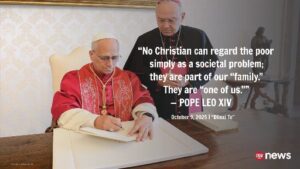
VATICAN CITY (SE): VATICAN (SE): The Holy See Press Office announced that Pope Leo XIV signed his first apostolic exhortation, Dilexi te [I have loved you], on the morning of October 4, the feast of St. Francis of Assisi, in the private library of the Apostolic Palace, in the presence of Archbishop Edgar Peña Parra, substitute for General Affairs of the Secretariat of State.
The document is expected to be a deeply scriptural reflection on poverty, justice, and the Church’s mission to serve those most in need. The exhortation builds upon a draft begun under Pope Francis, who died in April after 12 years of service, and is seen as a continuation of his vision. Pope Leo, an Augustinian and the first American-born pope, was elected on May 8 to succeedthe late pope. Like Lumen Fidei—which Pope Francis completed from Pope Benedict XVI’s notes—Dilexi te carries forward a work initiated by his predecessor.
Dilexi Te
Apostolic Exhoration of
Pope Leo XIV

Pope Francis’ final encyclical, Dilexit nos [He loved us], issued in October 2024, explored the divine and human love of the Heart of Jesus. Pope Leo’s new exhortation complements that teaching, turning the focus outward to the practical expression of love—especially toward the poor and marginalised.
It is not surprising that Pope Leo chose this theme for his first major document. Since his ordination in 1982, he spent almost two decades as a missionary in Peru, working closely with impoverished communities. His writings and public statements since his election have consistently shown his concern for inequality, economic injustice, and the widening gap between the rich and the poor.
In a previous interview, Pope Leo expressed his concerns about how the concentration of wealth fuels division. “Sixty years ago, CEOs might have been making four to six times more than workers; today it’s 600 times more,” he said. “…If that is the only thing that has value anymore, then we’re in big trouble.”
I encourage you not to distinguish between those who assist and those who are assisted… We are the Church of the Lord, a Church of the poor—all precious, all subjects, each bearer of a singular Word of God. Everyone is a gift to others
Pope Leo
During a recent Mass for Caritas workers in Albano, the pope said, “I encourage you not to distinguish between those who assist and those who are assisted… We are the Church of the Lord, a Church of the poor—all precious, all subjects, each bearer of a singular Word of God. Everyone is a gift to others.”
His message of inclusion and fraternity echoes Francis’ long-standing insistence that “the poor are at the heart of the gospel.” Like his predecessor, Pope Leo has underscored that the Church must be both a voice and a companion for the marginalised, especially in a world affected by war, inequality, and climate change.
At the Jubilee audience on October 4, the pope reflected on the day’s gospel [Luke 16:13–14], which speaks of the choice between serving God and serving wealth. He reminded pilgrims that St. Francis’ radical embrace of poverty—and St. Clare’s courageous imitation of his way—remain countercultural examples of gospel living. “Then, as today, one must choose,” he said. “Let us pray to be a Church that does not serve money or itself, but the Kingdom of God and his justice.”
Dilexi te is scheduled to be presented on Thursday, October 9, at 11:30 at the Holy See Press Office, Vatican News reported.The title, taken from Revelation 3:9, reflects the new pope’s desire to place love for the poor at the centre of his papacy.
The event will be led by Michael Cardinal Czerny, prefect of the Dicastery for the Service of Integral Human Development, and Konrad Cardinal Krajewski, papal almoner. They will be joined by Frédéric-Marie Le Méhauté, provincial of the Friars Minor for France and Belgium, via video link, and Sister Clémence of the Little Sisters of Jesus from the Tre Fontane community in Rome.
With Dilexi te, Pope Leo offers not only his first teaching document but also a statement of intent for his pontificate — a call for the Church to rediscover its heart through love for the poor and through service that reflects the compassion of Christ.








